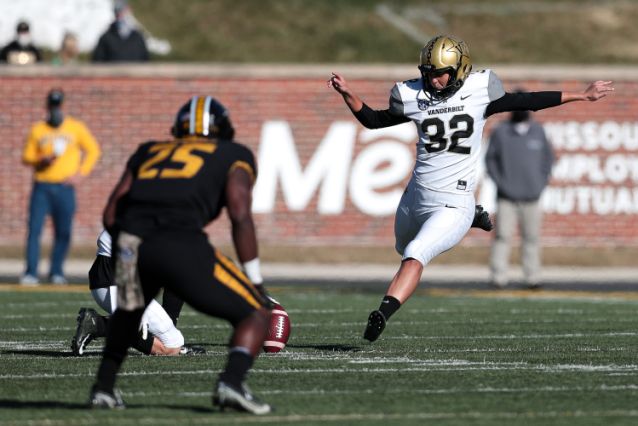Sarah Fuller Makes History with the Commodores Football Team
Opinion
When Sarah Fuller stepped onto the field at the University of Missouri on Saturday, Nov. 28, she wasn’t wearing the goalkeeper jersey associated with Vanderbilt University’s women’s soccer team. Instead, she wore a Commodores football jersey and a helmet with the words “Play Like A Girl” emblazoned on the back. The words were a reference to the nonprofit organization dedicated to encouraging girls to play sports and get exposure in science, technology, engineering, and mathematics related fields. And play like a girl she did. In just one game, Fuller had blasted open a gender barrier blocked by generations of male football athletes. On Saturday, Nov. 28, Fuller became the first woman to play in a Power Five football game.
This season was especially tough for Vanderbilt as the team had not won a single football game so far. On top of that, the coronavirus diminished the number of healthy players and left the team without a kicker. While the football team was slowly falling apart, Vanderbilt’s women’s soccer team had just won the Southeastern Conference championship, its first title since 1994. The 21-year-old starting senior goalkeeper, infamous for her strong kicks, was the football team’s best hope in succeeding. Though she had only been practicing with the team for one week, Fuller was fully committed and prepared. Prior to the game, she tweeted out “let’s make history,” setting the football world ablaze.
Derek Mason, the head coach at the time, had stated in a post-game news conference that he had no intentions of tapping Fuller as the new kicker for historic purposes. Instead, he said that it was out of necessity. Necessity. That word continuously rang in my ear. The team needed her. Despite the long run of an all-male Power Five football league, the Vanderbilt team needed her. It was not about gender, it was about necessity. And although I was proud of Mason for admitting these words, I also became curious. If Fuller had tried out for the team at the beginning of the season with the same skill level as the previous kicker, would she have been chosen or would her gender create an unnecessary obstacle for the position?
The simple answer? No. She would not have made the team. This divide towards such a commonly known sport is not just seen throughout professional football leagues, it’s also seen through school teams, club teams, and other nonchalant activities. This gender discrimination is a reality girls face everyday. Girls wanting to try football aren’t given the same encouragement as guys. They are deemed “unladylike,” “weak,” or “asking for attention.” Why is it that only a specific gender gets to enjoy such a universal sport? Why can’t girls be given the same encouragement guys receive?
In the last five years, the National Federation of State High School Associations reported a nearly 1,000-player increase in girls’ participation in 11-player tackle football. As encouraging as this number may seem, the 13 states with zero female participation squash it like a dead bird on a highway. So what does it take to increase these numbers? For one, the mindset of those who oppose female football players needs to be changed. Female football players such as Patricia Palinkas, Katie Hnida, Collette Smith, and Toni Harris have proved that women are capable of competing. However, as the saying goes, it takes two to tango. People who disagree with female football roles need to be educated in not just their morals, but also the law. Title IX, a federal civil rights law passed alongside the Education Amendments of 1972 protects people from discrimination based on sex in school related activities. Additionally, female athletes need to be given the opportunity to succeed apart from a male league. Several women’s leagues have been established over the years- however, none of them have been sustainable due to lack of funding and participants. The Women’s Football League Association (WFLA) is a new venture trying to close gender gaps in sports. Founded in 2018 by Lupe Rose, the WFLA set their first season to launch in 2020. The date has been postponed due to the coronavirus, but the 32-team league have continued to set their goals high and launch in May 2021.
Although many people dislike the idea of female football players and have continued to harass Fuller into leaving the team, she remains unbothered and continues to prepare for the next game. Luckily, according to quarterback Mike Wright, the other Vanderbilt players have welcomed her with open arms.
“I have worked hard to get where I am, and I was in the right spot at the right time to be called up on the football team, and I’ve been working really hard to perform for them,” Fuller said to the New York Times. “So at the end of the day I don’t care what the negative is.”
Unfortunately, Missouri shut out Vandy 41-0. Despite the score, what happened that Saturday altered the way many people view this “manly” sport. Maybe Fuller will get another shot at kicking a field goal in the final two games. Maybe a Power Five league will see another female player one day. But for today, I reminisce on Fuller’s achievement and think of all the little girls she inspired. They no longer have to dream of a female football athlete in a Power Five league and are shown that they can do anything they put their minds to.

Class of 2023
Hey, I'm Amy! I am currently the Sports Editor for the Horizon! Outside of the press room, my hobbies include playing soccer and running...







